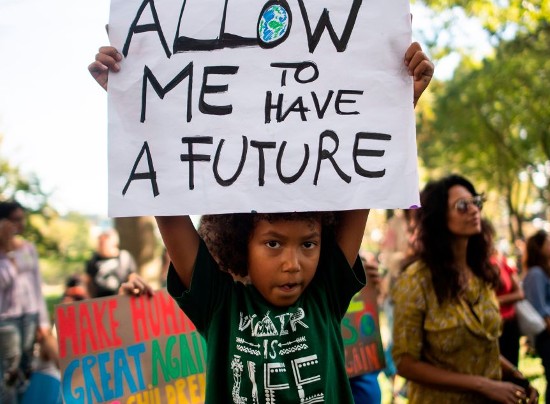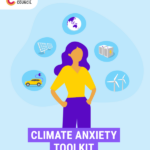In a report published in Lancet this month, a survey conducted in 10 countries indicates that children and young people are feeling powerless and vulnerable because of their governments’ response to climate change. The ten-country survey includes Australia, Brazil, Finland, France, India, Nigeria, the Philippines, Portugal, the United Kingdom, and the United States.
Those surveyed indicated they were dealing with emotional distress including sadness, fear, anger, powerlessness, helplessness, guilt, shame, despair, hurt, grief and depression. A large number indicated pessimism about the future and that humanity is doomed. They felt they wouldn’t have access to the same opportunities their parents had, that the things they value would be destroyed, that their security would be threatened, and that they would be hesitant to have children. Even if they thought their own country’s government was taking action to address global warming, they had persistent thoughts about what other countries were ignoring or downplaying when it came to climate change.
The first question asked was how young people report emotional, cognitive, and functional responses to climate change. Almost 60% said they felt very or extremely worried about it. More than 45% stated that climate change was negatively affecting their daily lives. And although there were variations from youth in different countries, the level of worry was consistently high whether reported from nations in the Global North or South. The highest level of worry came from youth in Portugal where the country since 2017 had seen dramatic increases in wildfires.
By category, the emotional state of the young people surveyed showed:
- 66.7% sad
- 50.9% helpless
- 61.8% anxious
- 67.3% afraid
- 30.9% optimistic
- 56.8% angry
- 50.7% guilty
- 45.6% ashamed
- 42.8% hurt
- 38.6% depressed
- 44.2% despairing
- 41.5% grieving
- 56% powerless
- 29% indifferent
When asked about more specific subjects, the young people indicated:
- 39.1% were hesitant to have children.
- 55.7% said humanity is doomed.
- 75.5% described the future as frightening.
- 54.9% said they wouldn’t have access to the same opportunities given to their parents.
- 51.7% thought their family’s security would be threatened physically, socially, and economically.
- 54.8% thought the things they most valued would be destroyed.
- 82.6% sad that people had failed to take care of the planet.
- 39.3% noted that when trying to talk about climate change to other people they were ignored or dismissed.
When asked about their government’s response to climate change:
- 58.5% stated that they and future generations were being betrayed.
- 64.4% accused their governments of lying about the effectiveness of the actions they were taking.
- And 60.1% felt that their governments were dismissive of people’s distress.
The report notes that with such high levels of distress and feelings of betrayal, young people are being negatively affected in terms of mental health. They noted that actions are needed by governments to address climate anxiety to protect the wellbeing of youth.
A final note states that the study was likely understating the levels of rising distress and concern in young populations. In the report’s conclusion it states:
“Our findings suggest that climate change, climate anxiety, and inadequate government response are all chronic stressors that could threaten the mental health and wellbeing of children and young people around the world…Climate anxiety is a collective experience, and based on our results, children and young people would benefit from having a social discourse in which their thoughts and feelings are respected and validated, and their concerns are acted upon by people in positions of power. Climate anxiety indicates the care and empathy that young people have for our world.”
One child is quoted. “I don’t want to die. But I don’t want to live in a world that doesn’t care about children and animals.”
The survey was developed by researchers at:
- The University of Bath, University of East Anglia, The London School of Hygiene and Tropical Medicine, and the Oxford Health National Health Service Foundation Trust, all in the UK,
- The University of Helsinki, in Finland,
- The College of Wooster, NYU Langone Health, Stanford University, The Climate Psychiatry Alliance, and The Climate Psychology Alliance, all in the US.









